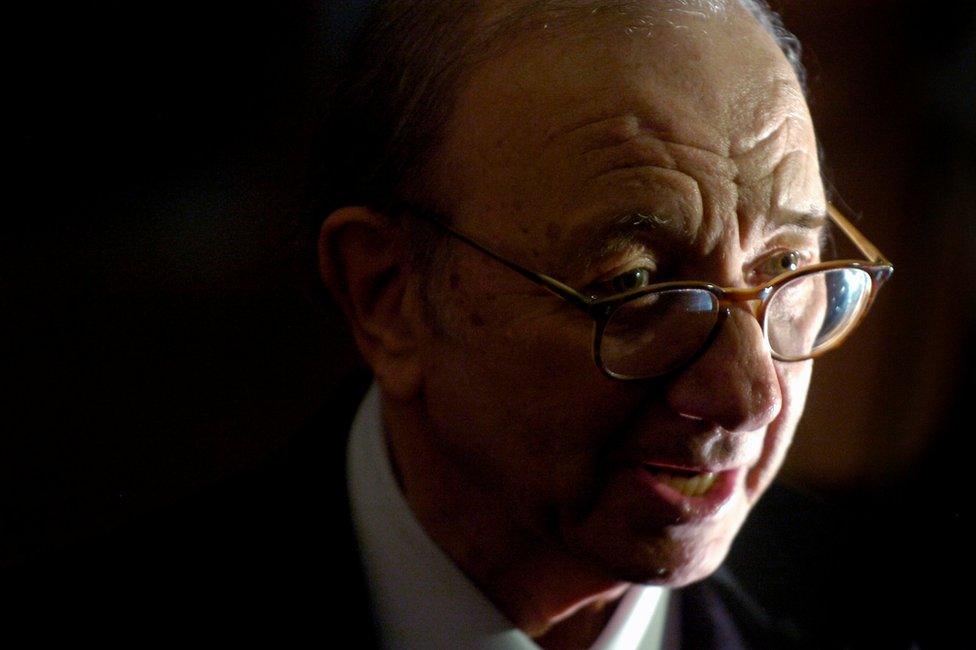Neil Simon: Celebrated US playwright dies aged 91
- Published

Simon is seen here in 2006
Celebrated US playwright Neil Simon has died aged 91 in his native New York City of complications from pneumonia, representatives announced.
Simon gained international fame in the 1960s for stage and screen comedies including The Odd Couple and Barefoot In The Park.
In 1991 he won the Pulitzer Prize For Drama with Lost in Yonkers.
"Some say he's the most successful playwright since Shakespeare," Barefoot star Robert Redford once said.
Simon was a prolific author. averaging at least one play a year for much of his career, and his work included the hit musicals Sweet Charity and They're Playing Our Song.
His wife, Elaine Joyce Simon, was at his deathbed along with his daughters, Ellen Simon and Nancy Simon, in New York-Presbyterian Hospital, his representatives said.
Musical theatre star Elaine Paige and actor Josh Gad were among those tweeting tributes to the author.
Allow X content?
This article contains content provided by X. We ask for your permission before anything is loaded, as they may be using cookies and other technologies. You may want to read X’s cookie policy, external and privacy policy, external before accepting. To view this content choose ‘accept and continue’.

Allow X content?
This article contains content provided by X. We ask for your permission before anything is loaded, as they may be using cookies and other technologies. You may want to read X’s cookie policy, external and privacy policy, external before accepting. To view this content choose ‘accept and continue’.

What works made him famous?
Some of the greatest American actors of the time starred in films of his plays, notably Walter Matthau and Jack Lemmon as The Odd Couple (1968).
In the comedy, Matthau played messy, poker-playing sports journalist Oscar Madison sharing an apartment with house-proud TV news writer Felix Ungar (Lemmon), as the two dealt with divorcing their wives.
Fans paid tribute to The Odd Couple and his other works on social media.
Allow X content?
This article contains content provided by X. We ask for your permission before anything is loaded, as they may be using cookies and other technologies. You may want to read X’s cookie policy, external and privacy policy, external before accepting. To view this content choose ‘accept and continue’.

Allow X content?
This article contains content provided by X. We ask for your permission before anything is loaded, as they may be using cookies and other technologies. You may want to read X’s cookie policy, external and privacy policy, external before accepting. To view this content choose ‘accept and continue’.

According to Variety, "Beginning in the 1960s, Simon could guarantee good Broadway advance sales, a rare feat for a writer.", external
His name was "synonymous with Broadway comedy and commercial success in the theater for decades", external, writes The New York Times.
His later works failed to connect with broad audiences in the same way but earlier ones like The Sunshine Boys and Plaza Suite were remade for TV, for new generations.
Who was Neil Simon?
He was born on Independence Day 1927, in The Bronx, son of garment salesman Irving Simon and his wife Mamie.
His Jewish childhood in the city would return again and again in his stage and screen work.
The psychological depth of his works may owe something to his own painful experiences early in life, notably the stormy relationship between his parents.
After writing comedy for radio in the 1940s, he tried television work before turning to Broadway and the cinema.
Among the honours he received was a Tony Award for Best Playwright in 1965 for The Odd Couple.
"When I was a kid, I climbed up on a stone ledge to watch an outdoor movie of Charlie Chaplin," Simon recalled for Life magazine.
"I laughed so hard I fell off, cut my head open and was taken to the doctor, bleeding and laughing... My idea of the ultimate achievement in a comedy is to make a whole audience fall onto the floor, writhing and laughing so hard that some of them pass out."